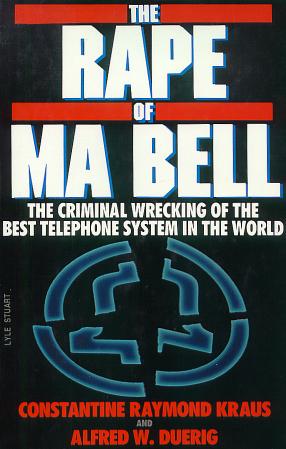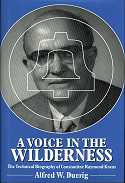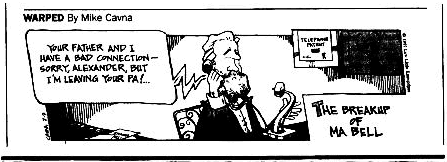|
The Rape of Ma Bell
The
Criminal Wrecking of the Best
Telephone System in the World
Ó1988
Lyle Stuart, Inc. - Secaucus, New Jersey
ALFRED W. DUERIG and
CONSTANTINE RAYMOND KRAUS
(Also see
"A Voice in the Wilderness" book
review at end of this page)
A BOOK REVIEW

Available from
Amazon.com, Inc.
Highly recommend buying this
book if you can find it in a used book store or online source for used books. If you are unable to find a copy in the used marketplace, you may download the
PDF version which was created from a hardbound copy of the book with permission
of the author, Al Duerig. Click
HERE to download.
If you are a serious Bell
System person like I am (we call ourselves "Bell Heads"), then this is
a must for your collection.
Book cover summary:
"This is the story of the
unwarranted and criminal dismantling of a company which offered the American
people the best telephone service in the world. As a result of actions by the
Federal government bureaucracy, the world's largest company has been
dismembered, assets deliberately destroyed, our national defense weakened, and
our international economic position damaged-a debacle that has cost the American
public as much as $800 billion dollars in the last 20 years.
Parts of this story have been told by corporate executives, lawyers, economists
and public officials, each with different viewpoints and emphases. Little has
been heard from telephone engineers-who built, operated, and, under court
orders, dismantled this communications network. This book is written by two such
engineers, whose combined careers span half the time between Bell's invention
and the present, and who worked in the mainstream of the events described.
The Rape of Ma Bell explores the past, present and future of our nation's
communications system. It describes the telephone's invention and early history,
and life in the Bell System as it was <in 1978>, then traces the
events-crimes according to many- of almost 20 years that led to Bell's demise.
It deals as well with the chaotic and costly situation that resulted and how
this has affected the telecommunications industry, the telephone customer, the
national defense and our international position. And it looks at the fabulous
future available to modern technology and offers suggestions as to what steps
should be taken in light of what has already happened. The authors have also
provided a short course for the layman in a few of the main concepts underlying
modern communications technology.
Constantine Raymond Kraus has spent much of his working life as an engineer and
administrator with the Bell System. He has been intimately connected with every
facet of communications. When he retired from Bell, he founded and headed
Consulting Communications Engineers, Inc., of Villanova, bringing together a
brain trust of 200 retired scientists and engineers representing 6,000 years of
experience and 500 patents. The 20-year-old company has worked for both
government and industry. Mr. Kraus also edits the CC E Newsletter which has a
wide circulation in the industry.
Alfred W Duerig was employed by the Bell Telephone Company of Pennsylvania for
thirty-seven years; during the last seventeen he headed the engineering
department. Before that he served in the United States Navy in various
communications positions. He is a registered professional engineer and also a
senior member of the Institute of Electrical and Electronics Engineers."
A
Voice in the Wilderness
by
Alfred W. Duerig - 1996
A BOOK REVIEW

Available from
Amazon.com, Inc.
"This book is dedicated to the
memory of Constantine Raymond Kraus, a lifelong crusader for competence and
integrity in industry and government; and also to the hundreds of
thousands of men and women who devoted much of their lives striving for the same
goals in the former Bell System." - Alfred W. Duerig
Title of book taken from a cover
letter Ray used for his newsletters where he says, "Against my desires, I am
being placed in a position similar to that of Billy Mitchell, Goddard, and
Rickover. I am a lone voice crying out in a wilderness of ignorance,
greed, and dishonesty."
Before presenting my book
review of "A Voice in the Wilderness", I
would like to present some background information on how I found out about this
second publication and some information on the co-authors that wrote "The Rape
of Ma Bell", Constantine Raymond Kraus
(hereafter referred to as "Ray"), and
Alfred W. Duerig (hereafter referred to as
"Al"),
Al sent an email to me on
November 2, 2001 after he had discovered
this website. He presented me with some interesting background on how
these books came into being.
Al and Ray
had just finished writing "The Rape of Ma
Bell" in 1988 when Ray asked Al if he would consider writing a "technical
biography" on Ray. Ray said he would get his
lawyer to draw up a contract, but before that could happen, Ray fell ill and
died at the age of 90 in 1990.
Al forgot about the technical biography until
1994, when he got a call from a lawyer who was handling Ray's wife's estate (she
died in 1994). A provision in her will stated that Al would be paid to write
said biography, publish it, and distribute about 400 copies to various of Ray's
former associates, and some engineering schools. Al hesitated, because there was
no one left alive that he could interview - but the lawyer said he had six large
cartons of material he could look over before deciding. So Al drove the
300 miles to Philadelphia, picked up the material, and after reviewing it,
decided he could do a passable job. The result is a small (130 page) book,
entitled "A Voice in the Wilderness" - the reason for the title will become
clear when you read the book.
Table of Contents:
Introduction
I: The Early Years - Kraus's genealogy, birth, early environment, and education
through college graduation.
II: A Career Begins - Kraus enters the workplace; some general background on the
history and organization of the Bell System.
III: Going Steady with Ma Bell - A summary of Kraus's Bell System career.
Contacts during this time with the author.
IV The Idea Factory - Covers Kraus's innovations, ideas, successes, and failures
throughout his Bell career.
V Ray and Doris - Marriage & family life; activities and interests outside of
work for Ray and Doris Kraus.
VI: A New Career - Formation of CCE after Kraus's retirement from Bell, his
entry into the competitive world.
VII: The Kraus Voicegram - Description o f Kraus's most significant invention.
VIII: Search for a Market - Kraus's efforts to promote and sell the Voicegram.
IX:
More Innovations - Buyer Credit Service, No Answer Tone, Educational TV, a
reading machine for the blind.
X: One Communications System for Mankind - A concept bringing together all
Kraus's ideas for the future in telecommunications.
XI: Ma Bell's House of Wonders - A review of Bell Labs's accomplishments and
Kraus's relationship to Bell Labs people and activities.
XII: Crusade for Quality - Kraus's constant emphasis on the need for better
telephone service.
XIII:
Kraus and the Regulators - Battles and testimony with the FCC; Prince Edward
Island
involvement.
XIV The Approaching Storm - The Bell System struggling for life in the years
leading up to the 1984 divestiture.
XV The Great Divorce - Kraus's reactions to the Bell breakup; his frustration at
not being able
to get the attention of prominent people.
XVI: The Rape of Ma Bell - The process of writing and promoting the book and
anecdotes
concerning it.
XVII: A Conspiracy of Silence - Kraus's two main antagonists-lawyers and the
media-and his view of the conspiracy of these groups to cover up the crime of
breaking up the Bell System. The letter writing campaign.
XVIII: Kraus and the Nation - Kraus's ideas on democracy and the future for our
society as a whole. Competitive versus cooperative handling of problems; need
for a more responsible press. Quotes from CRCs papers and correspondence on
these subjects.
XIX: The End of the Crusade - Ray Kraus's final years; his death and his legacy.
Book cover summary:
A Voice in the Wilderness
The Technical Biography of Constantine Raymond Kraus
by Alfred W. Duerig
The Kraus Voicegram System, Buyer Credit Service, no answer tone, and a computer
that can translate printed matter into synthesized speech-these ground breaking
innovations were conceived in the mind of one man, Constantine Raymond Kraus.
Ray Kraus was a man devoted to science and engineering who advanced many
ingenious ideas during his career not only to improve our communication systems
but also our lives.
Upon retiring from Bell of Pennsylvania,
Kraus formed his own company, Consulting Communications Engineers (CCE), which
combined the talents of a number of his associates who had already retired such
as Dr. Clarence Lovell, Ray Ruwell, Lou Fink, and Bill Davidson. Kraus knew that
their combined experience in research, development, and engineering was
invaluable to the communications industry. This dynamic union did indeed prove
to be successful as their subsequent clients included the U.S. Agency for
International Development, Motorola, IBM, Honeywell, GTE, Toshiba, Chase
Manhattan Bank, Ford Aerospace, and many others.
Alfred W Duerig worked with Ray Kraus for
many years at Bell Telephone, and he witnessed firsthand the power and
cutting-edge insights of Kraus's mind. In the pages of A Voice in the
Wilderness: The Technical Biography of Constantine Raymond Kraus, Duerig depicts
not only Kraus's life but his many struggles to bring his innovations to the
American public as well. In doing so, Duerig creates a unique look into the
workings of powerful organizations and a vivid portrait of a true pioneer
spirit. Ray was very much opposed to the break up of the Bell System and
was very outspoken about his reasons . . . but few listened.
My review . . .
Ray started his first career with the Bell
System in 1923 with Bell of Pennsylvania. Later, after mandatory
retirement from Bell at age 65, started his own business called Consulting
Communications Engineers (CCE). During his Bell career he held
the title of Assistant Engineer (a third-level management position more
impressive than the title!) where he worked on long-range planning studies
including numbering, dialing and charging arrangements.
In 1946, he was promoted to Engineer which
involved working as a general staff transmission engineer and then later worked
as a general military and special services engineer.
One of the noteworthy ideas Ray had that was
mentioned in this book was the "Voicegram" idea. In late 1939, while still
a relatively young engineer at Bell, Ray wrote a Memorandum describing what he
then called "Voice Letter Service." This can be compared to today's
voice-mail system. The idea was reviewed by Ray's boss and Ray's boss'
boss but it was decided to do nothing with this suggestion since such a service
would be in competition with Western Union and would surely not be permitted by
the FCC. The idea was filed away in an "Ideas" file.
In 1963 Ray wrote another paper titled
"Storage and Forwarding of Voice Messages." He developed the point that
ordinary telephone calls used "line switching," in which circuits were connected
together before information was transmitted, while his proposal was based on
"message switching," which did not require any through connection of circuits..
Ray foresaw the capabilities of electronic switching "software" to handle the
recording and message routing functions. This idea joined the Voicegram
idea in the "Ideas" file.
Ray had a very low opinion of lawyers and
politicians - especially with the divestiture case of the American Telephone and
Telegraph Company - a.k.a., the Bell System. An analogy that Ray made
about the Bell System divestiture was the equivalent of throwing all the
scientists out of NASA and letting a bunch of attorneys try to launch the
next space probe. Ray was not alone in his opinions. In 1897, Gene
Kemmelman, director of Consumer Federation of America, stated, "Regulation has
gotten a bum rap. It has provided cheap service and innovation."
Ray Kraus was especially incensed by Judge
Greene's action in the case. In particular, Ray was upset most by Greene's
edict that exchange and inter-exchange services be separated which required that
the entire telecommunications network be taken apart and rebuilt, and millions
of dollars of equipment be scrapped.
There were only 400 copies of this book
published; it makes an excellent companion book to "The Rape of Ma Bell".
I thank Alfred W. Duerig for allowing me to own one of those 400 copies and
present this information to the public. I only wish the public wasn't lied
to by the government and the media prior to divestiture so that maybe some parts
of that great Bell System would still be together today. In my opinion,
which follows Ray and Al's discussions in the books, the American people were
robbed by the US government of the best telephone service in the world on that
dreadful day of January 1, 1984. And to make matters worse, the
Telecommunications Act of 1996 was just another deadly stab by our politicians
into an already crippled telephone system.

Courtesy of Gary Goff and his wife who did the scanning.

We Offer Personalized One-On-One
Service!
Call Us Today at (651) 787-DIAL (3425)

 |

